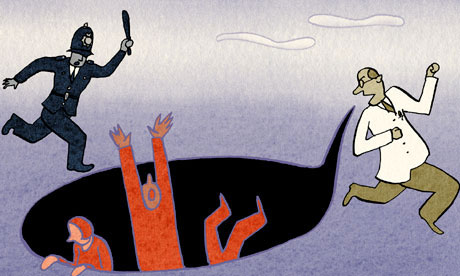
Illustration by Satoshi Kambayashi
On the evening of 5 April 2009, Luigi Guigno of L'Aquila in Italy was phoned by a sister terrified by tremors under their village. He told her not to worry. Government experts in "the forecasting and prevention of major risks" had just been on the news declaring there to be "no danger" of an earthquake. They need not go out into the street. A few hours later an earthquake struck and Luigi, his pregnant wife, their son and 300 others were crushed to death.
This week a local judge jailed six of the scientists, not for failing to predict the quake but for giving what he regarded as reckless reassurances. He fined them £6m and disbarred them from public office. World scientists condemned the verdict as inquisitorial and medieval. Britain's Lord May said it ignored the basic nature of scientific inquiry. Luigi's relatives disagreed. A local official said simply: "Some scientists didn't do their job."
When a forester fails to predict that a tree might fall and it kills someone, he is arrested. The same goes for a train mechanic who fails to repair a carriage, a cook who poisons a customer and a builder whose house collapses. They didn't mean to kill, but they failed to forecast what might ensue from their defective expertise.
Why does the same not apply to the professional scientists, experts and pundits on whose predictive genius so much of our life depends? The answer is that they claim protection, either through (usually weak) self-regulation or by pleading Lord May's fifth amendment, that the nature of scientific inquiry exonerates them of harmless mistakes.
This week agriculture ministers were left floundering by conflicting scientific guidance on bovine TB and badgers. Transport ministers were humiliated by statisticians failing to predict revenue on the west coast railway. The Totnes MP, Sarah Wollaston, called attention to the hysterical 2009 swine flu "forecast", which panicked Whitehall into blowing £500m on dubious Tamiflu, whose test results it refused to disclose.
Yesterday we were told that the nation was recovering from a second "dip" in a recession, which its forecasters had failed to predict. This is despite government economists being served by ever more powerful computers and mathematical models. No one, to the best of my knowledge, has been called to account for this failure.
Science has rarely enjoyed greater status. Schools are in thrall to it. Broadcasters grovel at its feet, with hours of programmes devoted to children gazing adoringly at scientific researchers, depicted as funny, garrulous, lovable role models. Science has taken the place of religion in a cocoon of uncritical certainty. Those who claim the title "scientist", be it natural or social, expect to combine the immunity of diplomats and the infallibility of popes. Science is merging into scientology.
Of course, Lord May is right, that academic inquiry must proceed uninhibited by risk from error. That is what universities are for, and why they should stay independent of the state. But the Italian geologists were not doing research: they were paid to apply their expertise to keep the public safe. They were not researching, but advising. They failed catastrophically.
The truth is that there is one law for the officer class and another for the poor bloody infantry. When experts trained to detect seismic phenomena fail, their fraternity does not criticise or review their work, but treats them as innocent and relieves them of blame. If an ordinary worker miscalculates the risk, if trains crash, trees fall, rivers are polluted or foodstuffs rot, he goes to jail. The difference is not in class of error but in class of person.
Since the dawn of time, people have craved prediction against uncertainty. They have paid soothsayers, witchdoctors, stargazers and palmists. They ask journalists at parties: "Who is going to win the American election?" and seem cheated if the reply is "I just don't know."
Some people are paid to forecast. Their job is to make assertions about the future, assessing likelihood over a spectrum of certainty. When a scientist says this or that "will happen", we expect it to have greater credence than if he had merely gazed into the entrails of a sacred goose.
The worst offenders are meteorologists. A Devon entrepreneur, Rick Turner, declared last month that he would sue the Met Office for inaccurate and "persistently pessimistic" forecasts, which had cost his region millions of pounds in lost revenue. I hope he wins. The gloomy Met Office, seemingly in the pay of the outbound tourism trade, is reckless with other's people's livelihoods. The weather on the Welsh coast this summer was not ideal, but it bore not the slightest resemblance to the daily "forecast" of it on the radio. The sun shone for far more hours than it rained, yet the forecast kept people away in droves. And there was never any hint of correction or apology.
Prediction matters to people. If the variables are too great, science should shut up, rather than peddle spurious expertise. But you can wave a banknote in a pundit's face and he will predict anything you like. Of course, it is outrageous to jail scientists for honest errors, but it is not outrageous to hold them to some account. When did Lord May's Royal Society last inquire into a scientific scandal? Journalists, like bankers, are getting hell these days for their mistakes. Why let seismologists off the hook?

No comments:
Post a Comment